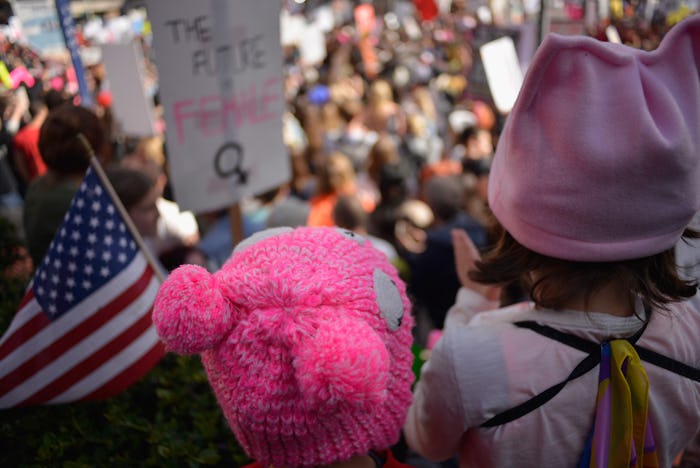News

Here's Why Merriam-Webster's 2017 Word Of The Year Is "Feminism"
As 2017 is winding down, more and more companies, organizations, and websites are releasing their versions and lists of this year's bests. Of course, some are more interesting than others, and that's where the world's premium dictionary comes in. Yeah, Merriam-Webster's word of the year is "feminism" and it's honestly such a positive development.
Obviously, 2017 hasn't felt like the most empowering year for women in the United States, but the dictionary's decision to highlight how important the term "feminism" has been marks a shift in the conversation. According to the dictionary website's explanation of the choice:
The word was a top lookup throughout the year, with several spikes that corresponded to various news reports and events. The general rise in lookups tells us that many people are interested in this word; specific spikes give us insight into some of the reasons why.
For example, after the Women's March on Washington in January, searches for the word saw a spike as news sites discussed just how feminist the march was. There are other examples, of course, of how the word was discussed throughout the year, but the gist of it is this: in politics, Hollywood, and social movements, feminism has been a purveyor of change in 2017.
While a president with numerous sexual assault allegations being made against him might not make it seem like the United States is paving the way for equality, there is still hope. And it comes in the form of Merriam-Webster's word of the year. Because so many people looked up the word on the dicitonary's website this past year, here's a little refresher on what it really means, per the dictionary itself:
Today’s definitions of feminism read: "the theory of the political, economic, and social equality of the sexes" and "organized activity on behalf of women's rights and interests."
And if the reactions on Twitter are any indication, the choice of the word of the year seems to be going over pretty well.
Honestly, just having so many people curious about feminism is progress in and of itself. Unfortunately, feminism is one of those words that tends to carry a negative connotation for some people, and it has for centuries. Back in the 19th century, suffragists were beginning to rise up in the United States, all fighting for the right to vote. But, of course, women standing up for themselves was a somewhat threatening concept to men at the time, which can be seem by the anti-suffragette political cartoons from that era.
Truly, people have been perpetuating feminism as a dirty word for decades now. So in the 2016 presidential election when candidate Donald Trump called Hillary Clinton "a nasty woman," pretty much no one was surprised. Women who try to move up in the world are often called names just for that fact alone. Clinton's campaign was no different, and Trump's behavior isn't surprising.
In fact, a gender studies professor at Harvard University, Caroline Light told The Washington Post following that infamous debate that calling a woman "nasty," was very much in the same vein as when someone calls a feminist a "feminazi":
It dates back to colonial times. A "nasty" woman is one who refuses to remain in her proper place, as defined by men. One who challenges male authority.
Obviously, feminism is pretty used to getting shot down for simply existing. Sound familiar, ladies?
This past year has been an uphill battle in terms of what it means to fight for equality. It seems like nothing positive has happened for women, but that isn't the case. Because if more people are researching the true meaning of feminism, then maybe, just maybe, there will be a surge in people identifying and acting as feminists. And that is progress.
Check out Romper's new video series, Romper's Doula Diaries:
Watch full episodes of Romper's Doula Diaries on Facebook Watch.